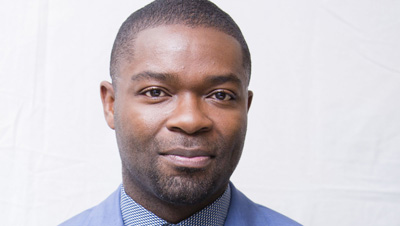
- Golden Globe Awards
David Oyelowo (Selma)
He is british of Nigerian descent, his last name is pronounced “oh-yellow-oh” and he not only plays Dr. Martin Luther King as if he were born in Atlanta, Georgia – he becomes King in the critically acclaimed Selma.On Christmas Day, instead of having a festive lunch or dinner, David Oyelowo joined his director Ava DuVernay and visited five movie theatres all across Los Angeles to check out the audience’s reaction on opening day. This is classic Oyelowo if you believe his directors and colleagues: he is one of the most passionate people in show business and this passion does not end with his own part but encompasses the entire project and everyone and everything in it.“It had to be a being rather than a doing of him. His spiritual life was a huge part of what motivated him. His faith was the drop-off point of non-violence as a notion—the notion that love is how you combat hate. And because I am a man of faith myself, being a Christian, I felt that I had to call upon everything I already knew and open up myself to things I didn’t yet know in the hope that it would all come together.” He says and is still astonished of how much MLK accomplished in a short life: “They were young people. They were in their 20s and 30s when they were fighting this fight. What we see in Selma was going on when King was 36.”He admits to staying in character during the shoot: “My wife felt like she was having an affair for three months.” He saw this kind of acting first when he did Lincoln with Daniel Day Lewis who is his favorite actor. And he does feel that his personal distance to a story he certainly did not grow up with in England, landed him the part rather than hindering it: “I just approached him as a man and I think that helped.”Oyelowo first heard about the project in 2007, the year he moved to America. He says it was his other parts, the preacher in The Help, the Union soldier in Lincoln, the fighter pilot in Red Tails and the black panther in The Butler who really prepared him for MLK. He also has three completely different views on what it means to be a black man since he has lived in three different countries with three different experiences: “In Africa black people are not a minority. In England there’s racism but it is different than in America. And I think, not having grown up in the U.S. has helped me have the confidence it takes to make it. I call it the Sidney Poitier syndrome. I truly believe that Sidney Poitier achieved what he did, when he did, the way he did, because he came from the Caribbean. He was born there and so by the time he came to the States, he had no notion of why anyone should marginalize him on the basis of race, and so he plowed through all that prejudice, almost with a glorious ignorance about what was coming back at him. And I share that with him because my formative years were in Nigeria.”Now 38, Oxford born and educated, he made a name for himself as the first black actor to play a Shakespearean king, Henry VI. He broke into television with the British spy-series MI-5, acted in The Last King of Scotland, The Paperboy, the above mentioned The Help, Lincoln and The Butler, and this year alone in two other films, Interstellar and A Most Violent Year. If it had been up to his father he would have become an engineer or a surgeon. But now he seemed to have come around: “He’s seen the film and all the press around Selma and he couldn’t be prouder” grins the actor.Elisabeth Sereda